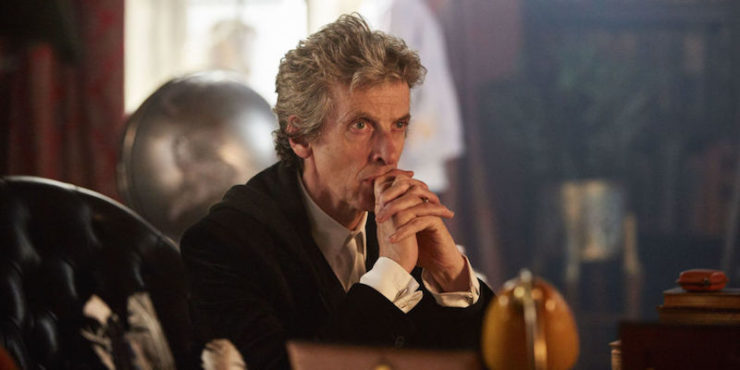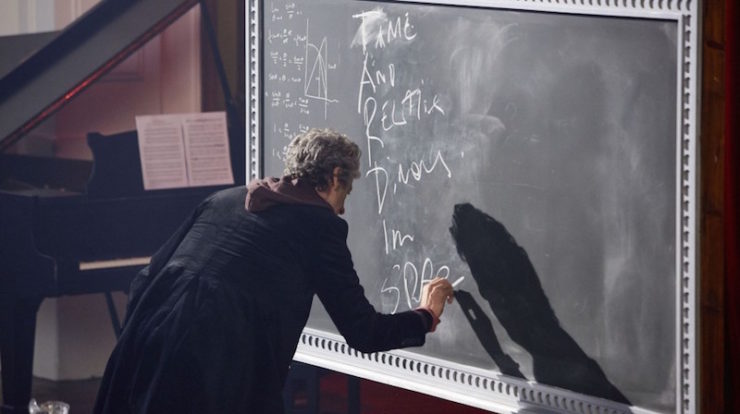Doctor Who is always a new show. Every couple of years it transmutes itself into something new and different, and every time fans wonder if they will like that something. So there’s no way to predict with utter surety whether or not the collective fandom will enjoy the new road. Some will. Some won’t.
That said, season ten’s premiere feels like a homecoming—in more ways than one.
In the absence of friends and companions, the Doctor has been acting as a professor at a Bristol university, which is where he meets Bill Potts. Bill, a foster teen who is working in the cafeteria rather than attending the school, keeps showing up to the Doctor’s lectures—which isn’t such a phenomenon among the student body (since he clearly doesn’t have a true syllabus of any sort and who knows if his classes are even registered with the school), but is where Bill is concerned… because she smiles when she doesn’t understand things instead of frowning.
The Doctor has been doing this for a while now. He knows the signs when he sees them.

He offers to tutor Bill on weeknights despite her lack of student status. And when the shenanigans start (as they always will when the Doctor is around), the Doctor finds himself in the position to take a renewed stab at being a universal tour guide to another kid who is looking for the extraordinary. Even though he’d promised he was done with that racket after losing his best friend and forgetting her face forever. While every companion loss is hard for the Doctor, this latest one has been particularly difficult to tackle because of its unusual goodbye—losing all of his memories of Clara Oswald, but remembering their general time together and the mistakes he made over the course of their friendship. Teaching—for fifty years now, according to Bill—as penance because he does not believe that he deserves another chance to muck it all up again.
The formula is not new for the show, and the “monster” of the week while appropriately scary is nothing to write home about creatively-speaking. But that’s hardly point at the moment. Doctor Who has spent all of Steven Moffat’s tenure stuck in a cycle of “more epic than thou” holiness, and while parts of the ride have been incredibly fun, others parts have been too overblown to connect with, to enjoy for enjoyment’s sake. The show has lost some of its clap trap cardboard box charm, an element that brought many fans to it in the first place. Even saving the whole universe can get old when you do it every single week, right?

While the bombastic is fun, and big plot arcs can be great when executed astutely (ahem), sometimes it helps to distill it all down for a bit. This season is clearly up to that challenge: The Doctor’s opening lecture talks about the flexibility of time, about what it means to experience it, then calls it what it is: “Time and Relative Dimensions in Space.” The acronym for the TARDIS, which he then distills down to… life. The TARDIS is a gateway for experiencing life, as stupendous as its abilities are. It allows us to go forward and back and all over the known universe, but ultimately, that journey is still just another form a life. A great one, too.
Which is just another way of saying that Doctor Who is digging deep and unearthing its heart. And that is why it’s not at all surprising to find so many little affirmations of simpler times. The Doctor has two pictures on his desk that he consults over the course of this dilemma; one of River Song, who he recently spent years alongside for their final “night” in Darillium, and Susan, his granddaughter and the show’s very first TARDIS companion. And these images say a lot about the Doctor’s state of mind (and thus the show’s)—they are people whom the Doctor loved dearly, people whose opinions will always hold weight. And they are people he arguably mistreated at specific points in their relationship—River always felt unimportant next to the Doctor’s splendor, and Susan was left behind by her grandfather when he worried that she would never herself make the choice to leave him and live her own life.

The Doctor is missing his buddy dynamic, but more than that, he’s clearly missing his early days. Back when he had companions who thought of him as a funny teacher (like dear old Ace), when got to educate ordinary people about the big wide universe. He wants to be someone’s friend again, someone’s tutor, he wants to be trusted. He wants to have the sort of adventures that his various heydays provided. (And given how many little plot elements of this episode were lifted from Douglas Adams’s Shada, it looks as though he might succeed.) Having someone as canny as Bill around is an exciting prospect—someone who likes “sci-fi” stuff, someone who is smart but unaccustomed to how the whole process works, someone who is fully able to call him out on his sidestepping. Someone who rightfully questions why the word TARDIS is an acronym in English if the Doctor is from another world entirely. (Haven’t we all been wondering that for ages?)
Someone who reminds him that just because he’s scared of committing to the journey again doesn’t mean that he has a right to erase someone’s greatest memories.

This change in the show’s tone, in the Doctor state of mind, is made plain with his first promise to Bill as she steps on the TARDIS: you are always safe inside these doors. It’s not about grandstanding and shouting to the sky about how nothing gets past him, it’s not about being the top dog in charge of Earth’s protection. It’s about discovery and pursuit of the new. It’s about days of yesteryear when he was called “sweetie” and “grandfather” and “professor.”
And at this specific point in time (or life, as the Doctor would put it), it’s deeply gratifying to have that show back.
Emmet Asher-Perrin still hasn’t formed an opinion on Nardole, though. You can bug her on Twitter and Tumblr, and read more of her work here and elsewhere.










